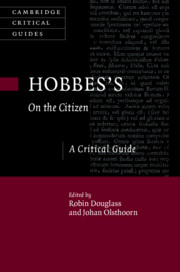Refine search
Actions for selected content:
12 results
Chapter 10 - “A Rhapsody of Heresies”: The Scriptural Politics of On the Citizen
-
-
- Book:
- Hobbes's <I>On the Citizen</I>
- Published online:
- 15 November 2019
- Print publication:
- 05 December 2019, pp 180-198
-
- Chapter
- Export citation
Chapter 6 - Property and Despotic Sovereignty
-
-
- Book:
- Hobbes's <I>On the Citizen</I>
- Published online:
- 15 November 2019
- Print publication:
- 05 December 2019, pp 108-125
-
- Chapter
- Export citation
Chapter 4 - The Right of Nature and Political Disobedience: Hobbes’s Puzzling Thought Experiment
-
-
- Book:
- Hobbes's <I>On the Citizen</I>
- Published online:
- 15 November 2019
- Print publication:
- 05 December 2019, pp 71-88
-
- Chapter
- Export citation
Chapter 2 - Hobbes and Aristotle on the Foundation of Political Science
-
-
- Book:
- Hobbes's <I>On the Citizen</I>
- Published online:
- 15 November 2019
- Print publication:
- 05 December 2019, pp 31-50
-
- Chapter
- Export citation
Chapter 7 - Sovereignty and Dominium: The Foundations of Hobbesian Statehood
-
-
- Book:
- Hobbes's <I>On the Citizen</I>
- Published online:
- 15 November 2019
- Print publication:
- 05 December 2019, pp 126-144
-
- Chapter
- Export citation
Chapter 9 - Hobbes on Love and Fear of God
-
-
- Book:
- Hobbes's <I>On the Citizen</I>
- Published online:
- 15 November 2019
- Print publication:
- 05 December 2019, pp 161-179
-
- Chapter
- Export citation
Introduction
-
-
- Book:
- Hobbes's <I>On the Citizen</I>
- Published online:
- 15 November 2019
- Print publication:
- 05 December 2019, pp 1-11
-
- Chapter
- Export citation
Chapter 8 - Corporate Persons without Authorization
-
-
- Book:
- Hobbes's <I>On the Citizen</I>
- Published online:
- 15 November 2019
- Print publication:
- 05 December 2019, pp 145-160
-
- Chapter
- Export citation
Chapter 12 - Sovereign-Making and Biblical Covenants in On the Citizen
-
-
- Book:
- Hobbes's <I>On the Citizen</I>
- Published online:
- 15 November 2019
- Print publication:
- 05 December 2019, pp 217-235
-
- Chapter
- Export citation
Chapter 5 - Motivation, Reason, and the Good in On the Citizen
-
-
- Book:
- Hobbes's <I>On the Citizen</I>
- Published online:
- 15 November 2019
- Print publication:
- 05 December 2019, pp 89-107
-
- Chapter
- Export citation
Chapter 11 - On the Citizen and Church-State Relations
-
-
- Book:
- Hobbes's <I>On the Citizen</I>
- Published online:
- 15 November 2019
- Print publication:
- 05 December 2019, pp 199-216
-
- Chapter
- Export citation

Hobbes's On the Citizen
- A Critical Guide
-
- Published online:
- 15 November 2019
- Print publication:
- 05 December 2019
